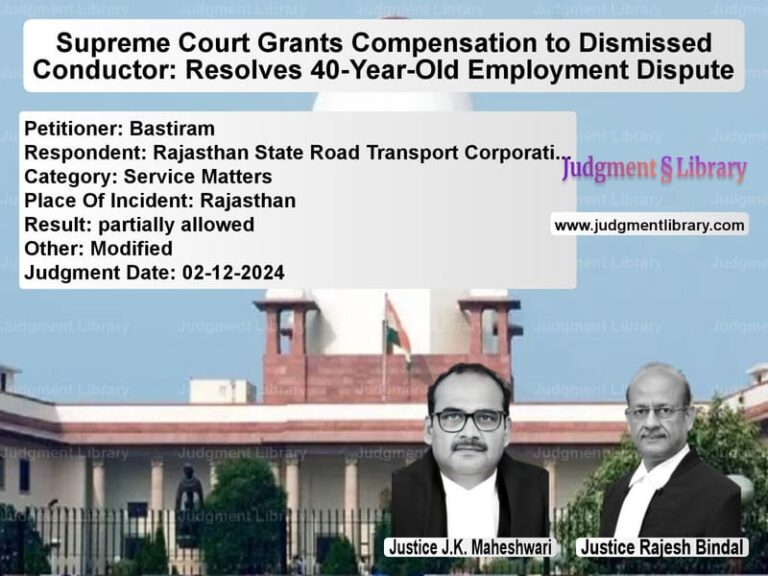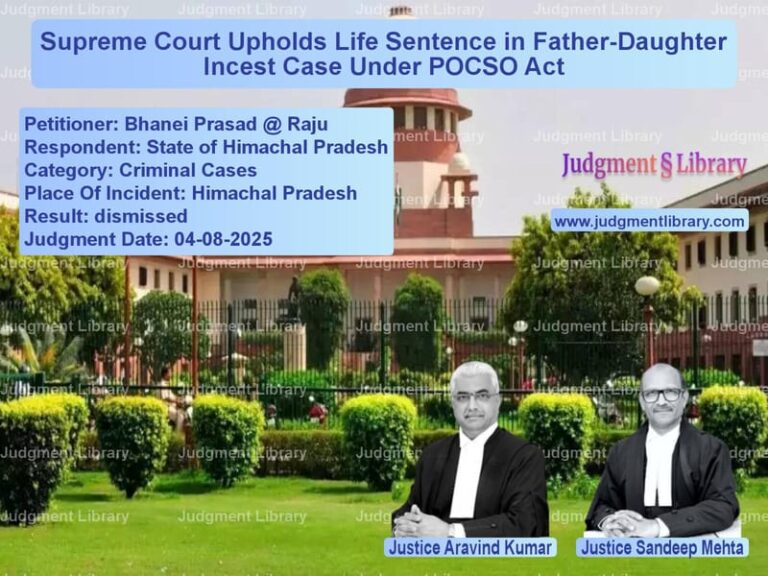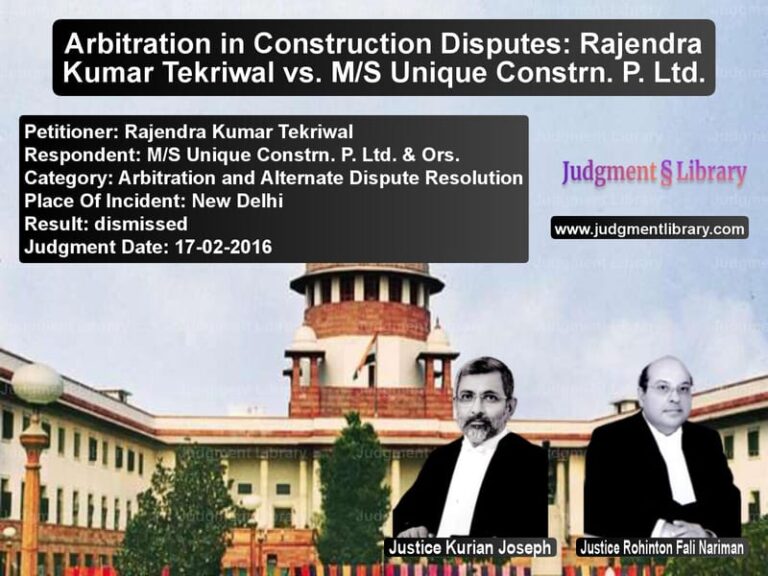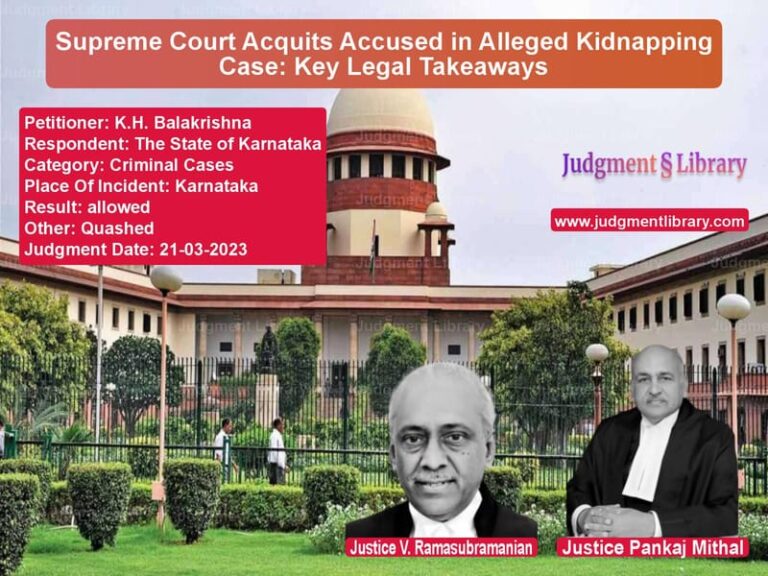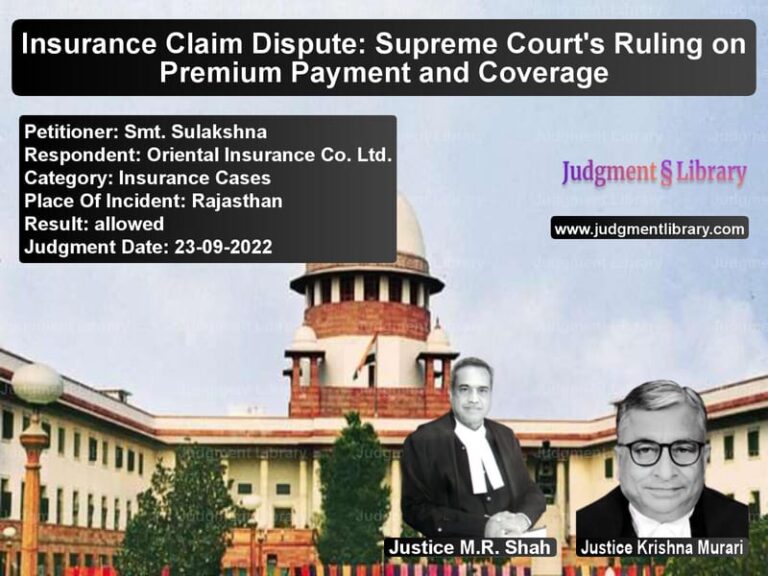Plea of Juvenility Rejected in Pawan Kumar Gupta vs. State of NCT of Delhi
The case of Pawan Kumar Gupta vs. State of NCT of Delhi is a significant judgment concerning the plea of juvenility under the Juvenile Justice (Care and Protection of Children) Act, 2000 (JJ Act). The Supreme Court was called upon to decide whether the petitioner, Pawan Kumar Gupta, was a juvenile at the time of the offense and whether his plea of juvenility, raised at multiple stages, could be reconsidered.
Background of the Case
Pawan Kumar Gupta was convicted for his involvement in the infamous Delhi gang rape case of December 16, 2012. He was sentenced to death along with three other convicts. The plea of juvenility was raised by him at different judicial stages, asserting that he was under 18 years of age at the time of the offense and, therefore, could not be sentenced to death under the JJ Act.
To substantiate his claim, Pawan Kumar Gupta produced a school leaving certificate from Gayatri Bal Sanskar Shala, Narayan Pur, Tanda, District Ambedkar Nagar, Uttar Pradesh, which stated his date of birth as October 8, 1996. If valid, this document would indicate that he was 16 years and 2 months old at the time of the offense. The Delhi High Court dismissed his plea, following which he filed a Special Leave Petition (SLP) before the Supreme Court.
Arguments of the Petitioner (Pawan Kumar Gupta)
The petitioner argued that:
- His school leaving certificate proved that he was a minor at the time of the offense.
- The investigating officials had found the certificate to be genuine.
- As per Section 21 of the Juvenile Justice Act, no minor can be sentenced to death or life imprisonment.
- The courts failed to conduct an independent inquiry under Section 7A of the JJ Act.
- The plea of juvenility can be raised at any stage of judicial proceedings, even after the final verdict, citing Ram Narain v. State of Uttar Pradesh (2015) 17 SCC 699 and Upendra Pradhan v. State of Orissa (2015) 11 SCC 124.
Arguments of the Respondents (State of NCT of Delhi)
The prosecution contended that:
- The plea of juvenility had already been rejected multiple times by the trial court, the High Court, and the Supreme Court.
- The school certificate was considered but was not deemed conclusive evidence.
- The investigating officials verified his date of birth through school records and parental statements, which confirmed he was above 18 at the time of the offense.
- His plea was merely an attempt to delay the execution of his death sentence.
Key Observations of the Supreme Court
The Supreme Court examined the case on the following key issues:
- Whether the petitioner had already exhausted his right to raise the plea of juvenility.
- Whether the school leaving certificate provided credible proof of his age.
- Whether an independent inquiry under Section 7A of the JJ Act was necessary.
- Whether the High Court erred in rejecting the plea.
The Court made the following observations:
- The plea of juvenility had already been raised before the trial court, which had rejected it based on parental statements and school records.
- The High Court had examined the same plea and found no merit in it.
- The Supreme Court itself had rejected this argument earlier in a review petition dated July 9, 2018.
- The accused could not continuously re-litigate the same issue to delay the execution of his sentence.
- The plea of juvenility can indeed be raised at any stage, but not when it has been conclusively rejected at multiple levels of the judiciary.
Verbatim Court Findings
The Supreme Court firmly stated:
“Once a convict has chosen to take the plea of juvenility before the learned Magistrate, High Court, and also before the Supreme Court, and the said plea has been rejected up to the Supreme Court, the petitioner cannot be allowed to re-agitate the plea of juvenility by filing a fresh application under Section 7A of the JJ Act.”
Additionally, the Court emphasized:
“The petitioner earlier raised the plea of juvenility in the review petition filed before the Supreme Court against the death penalty awarded to him and the same was dismissed by the Supreme Court on 09.07.2018.”
Final Judgment
The Supreme Court upheld the Delhi High Court’s decision and dismissed the plea of juvenility, ruling that:
- Pawan Kumar Gupta was not a juvenile at the time of the offense.
- His plea had already been conclusively rejected.
- He could not continuously misuse legal provisions to delay execution.
Final Verdict: Special Leave Petition dismissed.
Petitioner Name: Pawan Kumar Gupta.Respondent Name: State of NCT of Delhi.Judgment By: Justice R. Banumathi, Justice Ashok Bhushan, Justice A.S. Bopanna.Place Of Incident: Delhi.Judgment Date: 20-01-2020.
Don’t miss out on the full details! Download the complete judgment in PDF format below and gain valuable insights instantly!
Download Judgment: Pawan Kumar Gupta vs State of NCT of Delh Supreme Court of India Judgment Dated 20-01-2020.pdf
Direct Downlaod Judgment: Direct downlaod this Judgment
See all petitions in Murder Cases
See all petitions in Juvenile Justice
See all petitions in Bail and Anticipatory Bail
See all petitions in Judgment by R. Banumathi
See all petitions in Judgment by Ashok Bhushan
See all petitions in Judgment by A. S. Bopanna
See all petitions in dismissed
See all petitions in supreme court of India judgments January 2020
See all petitions in 2020 judgments
See all posts in Criminal Cases Category
See all allowed petitions in Criminal Cases Category
See all Dismissed petitions in Criminal Cases Category
See all partially allowed petitions in Criminal Cases Category


